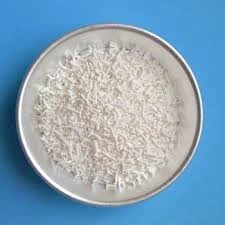
Understanding Food Additive E471 Its Uses and Safety Concerns in Food Products
Understanding Food Additive E471 An Insight into Emulsifiers
Food additives play a significant role in the food industry, ensuring the stability, texture, and quality of various products. Among these additives, E471, or mono- and diglycerides of fatty acids, has gained prominence. This emulsifier is commonly used in a wide range of food products, from baked goods to margarine, but what exactly is E471, and why is it so widely utilized?
What is E471?
E471 is derived from glycerol and fatty acids, which can be sourced from both animal and vegetable fats. It serves primarily as an emulsifier, helping to blend ingredients that typically do not mix well, such as oil and water. By reducing the surface tension between these components, E471 enhances the texture and stability of food products, allowing for a smoother mouthfeel and improved appearance.
This additive can also act as a stabilizer and thickener. In many applications, it assists in maintaining the uniformity of emulsions, ensuring that the mixture remains homogenous throughout its shelf life. This functionality is particularly vital in products like ice cream, where an even distribution of ingredients contributes to a creamy texture.
Applications of E471
E471 is prevalent in various food items, including
food additive 471

- Baked Goods In cakes and pastries, E471 helps retain moisture, improving shelf life and texture. - Margarine and Spreads It facilitates the combination of oils and water, giving these products their desired consistency. - Dairy Products E471 is often used in creamers and cheese products to maintain a smooth texture. - Confectionery In chocolates and candies, it prevents fat bloom and improves the mouthfeel.
The versatility of E471 makes it an essential component in many processed foods, as manufacturers seek to enhance product quality and shelf stability.
Is E471 Safe?
The safety of E471 has been scrutinized in various studies. Regulatory bodies, including the European Food Safety Authority (EFSA) and the United States Food and Drug Administration (FDA), have deemed E471 safe for consumption in the recommended quantities. However, there are important considerations regarding its sources. Whereas plant-derived E471 is typically favored due to dietary preferences and ethical considerations, E471 derived from animal fats may not be acceptable for vegetarians, vegans, or certain religious dietary laws.
While E471 is considered safe for the general population, individuals with specific allergies to certain fats may need to exercise caution. As with any food additive, moderation is key. The consumption of highly processed foods high in additives often correlates with poorer dietary choices, emphasizing the need for balanced nutrition.
Conclusion
E471 is a multifunctional food additive that plays a crucial role in the food industry. Its ability to emulsify, stabilize, and enhance texture makes it indispensable in various products. As consumers become more aware of the ingredients in their foods, it is essential for manufacturers to provide transparency about the sources and purposes of additives like E471. Ultimately, understanding the role of food additives helps consumers make informed choices about their diets and the products they consume. While E471 is considered safe for most, an awareness of one’s dietary preferences and restrictions will ensure a healthier relationship with processed foods.
-
Pure Sodium Dichloroisocyanurate Dihydrate | Powerful DisinfectantNewsAug.29,2025
-
Industrial Chemicals: Quality & Purity for Every IndustryNewsAug.28,2025
-
Nitrile Rubber Honoring Strict Production StandardsNewsAug.22,2025
-
Aspartame Ingredients Honoring Food Safety ValuesNewsAug.22,2025
-
Fertilizer for Balanced Plant NutritionNewsAug.22,2025
-
Cyanide Gold Processing with High Purity AdditivesNewsAug.22,2025
-
Formic Acid in Textile Dyeing ApplicationsNewsAug.22,2025
Hebei Tenger Chemical Technology Co., Ltd. focuses on the chemical industry and is committed to the export service of chemical raw materials.
-

view more DiethanolisopropanolamineIn the ever-growing field of chemical solutions, diethanolisopropanolamine (DEIPA) stands out as a versatile and important compound. Due to its unique chemical structure and properties, DEIPA is of interest to various industries including construction, personal care, and agriculture. -

view more TriisopropanolamineTriisopropanolamine (TIPA) alkanol amine substance, is a kind of alcohol amine compound with amino and alcohol hydroxyl, and because of its molecules contains both amino and hydroxyl. -

view more Tetramethyl Thiuram DisulfideTetramethyl thiuram disulfide, also known as TMTD, is a white to light-yellow powder with a distinct sulfur-like odor. It is soluble in organic solvents such as benzene, acetone, and ethyl acetate, making it highly versatile for use in different formulations. TMTD is known for its excellent vulcanization acceleration properties, which makes it a key ingredient in the production of rubber products. Additionally, it acts as an effective fungicide and bactericide, making it valuable in agricultural applications. Its high purity and stability ensure consistent performance, making it a preferred choice for manufacturers across various industries.





